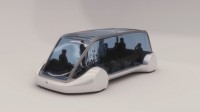Hyperloop technology — which relies on magnetic levitation, steel tubs and vacuum pumps — is one way that hopeful technologists promise to improve the travel experience. Most recently, a Missouri congressman proposed a hyperloop between Kansas City, Missouri and St. Louis, which would take 30 minutes to travel 250 miles. In Las Vegas, Nevada, Elon Musk’s The Boring Company (TBC) landed its first commercial contract, for $48.7 million, to build a “people mover” that would shuttle people around the city’s Convention Center, expected to be ready for CES 2021.
The Wall Street Journal reports that Virgin Hyperloop One co-founder/chief technology officer Josh Giegel stood with Missouri House of Representatives’ Elijah Haahr, who proposed that the state build a hyperloop “estimated to cost $7 billion to $10 billion.” Haahr “convened a blue-ribbon panel to investigate the feasibility of the Missouri project … [and] U.S. Secretary of Transportation Elaine Chao also announced a new council to identify and resolve regulatory hurdles the same month.” So far, Virgin Hyperloop One has a single test track in Las Vegas, and Giegel reported he is “trying to move to commercial operations in six years.”

“People that have a higher value of time are willing to pay for a premium of service,” said Giegel, who noted that his company is “targeting the short-haul commuter flight market.” In 2018, Hyperloop Transporation Technologies inked a deal to “build China’s first hyperloop, connecting the city of Tongren to its airport.”
TechCrunch reports that the Las Vegas Convention Center’s renovation, slated for completion by CES 2021, will expand it to 200 acres and a distance of two miles from end-to-end. That’s what prompted the Las Vegas Convention and Visitors Authority to recommend Musk’s Boring Company’s hyperloop project, dubbed the Campus Wide People Mover or CWPM. The board approved the contract last week, but added the requirements that the Boring Company “achieve specific milestones … [and] withholds over two-thirds of payments until construction is complete.”
The deal also “requires The Boring Company to meet specific ridership goals.” The LVCVA is expected to outlay an initial $1.2 million to TBC in 2019, followed by “$15 million in 2020 and the final $32.47 million in 2021.” TBC has stated that the Vegas project could ultimately “connect downtown, the Las Vegas Convention Center, the Las Vegas Boulevard Resort Corridor and McCarran International Airport.”
The people mover will require “the construction of twin tunnels for vehicles and one pedestrian tunnel … [as well as] three underground stations for passenger loading and unloading and an elevator or escalator system for passenger access to each station.” Users will be moved via modified electric Teslas, described as autonomous vehicles.
The LVCVA contract stipulates that Musk’s company “test the system for three months.” Musk’s company has also detailed a 35.3-mile Loop system between Washington, D.C. and Baltimore, but an environmental assessment has revealed failure to “meet several key national safety standards.”

No Comments Yet
You can be the first to comment!
Sorry, comments for this entry are closed at this time.